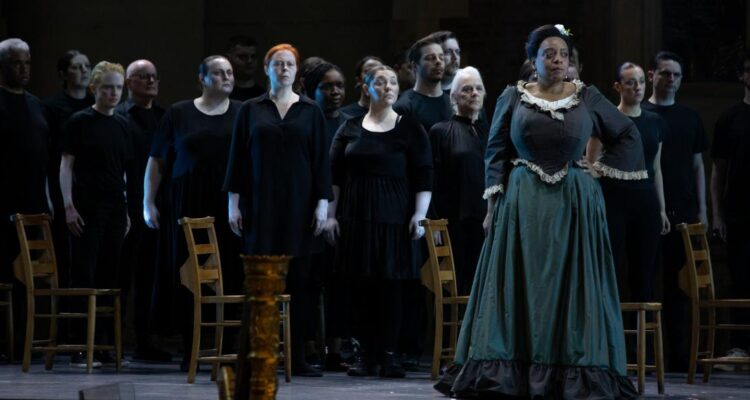Edgar, Puccini’s second opera after Le Villi, was commissioned by Ricordi. It was not a success and went through many revisions. Holland Park’s three-act version instead of the original four-acter is Puccini’s final revision. Eventually, Puccini gave up on it after trying, saying E Dio ti GuARdi da quest’opera! (And may God protect you from this opera!)
Puccini was unduly harsh on himself. His next opera, Manon Lescaut, was a resounding success. Despite Edgar’s flaws, it contains some wonderful music. A discerning ear will catch glimpses of Puccini’s future triumphs, such as Lescaut, Bohème, and Tosca. The music is lush, with a rare, gorgeous baritone solo and the early signs of Puccini’s signature small-phrase themes.
The story is far-fetched. Many operas are. After all, people do not burst into song when they are joyous or miserable. What counts is that we are carried away by Puccini’s emotional sweep of the melodies. Edgar’s melodies are terrific.
Edgar is a complex character. He burns his house down to make a point, leads a life of debauchery, and is torn between two women: Tigrana, a seductive temptress who leads him astray, and Fidelia, who loves him genuinely. Frank also loves Tigrana. Edgar joins the army, and when his coffin returns, it is revealed he has been killed. Tigrana and Fidelia are distraught. A priest tempts Tigrana into denouncing Edgar for jewels, to which she succumbs, not realizing the priest is Edgar in disguise. Fidelia and Edgar announce their wedding, but Tigrana, in a jealous rage, kills Fidelia.
An unconvincing backstory shows Tigrana and Edgar meeting as children, despite their different social circles—Edgar becoming a rich, entitled man and Tigrana a courtesan.
Holland Park are wonderful at unearthing neglected operas, and Edgar, in Puccini’s centenary year, is a perfect choice. This semi-staged version has only three performances. However, bearing in mind that the aim is to make a success out of an original flop, the casting is of paramount importance. For a production of Edgar to work, it needs the correct singers. The characters must be credible. They missed a trick in casting, which would have elevated Edgar to ‘unmissable’. The mezzo part of sex-siren Tigrana, who must be gorgeous. Like Samson, Edgar knows he must keep away. One must believe that Edgar cannot bring himself to dump her, however much he wants to. He joins the army to escape. Tigrana needs the sexy earthy mid/chest register of a real mezzo, with a repertoire of Eboli/Azucena/Delilah/Carmen. Edgar hinges above all on the right singer for Tigrana. Unfortunately, the production fails because Tigrana, sung by British soprano Gweneth Ann Rand, looks like Edgar’s frumpy aunt and the antidote to a sex siren. It makes the plot unbelievable. A soprano cannot sing the mid/low register as Puccini intended it to sound. The top is shrill, the mid/low register are inaudible. Why are sopranos are given mezzo roles which they cannot sing, when there are many excellent mezzos around? There is no chemistry between Tigrana and Edgar.
The singing for all characters is demanding, needing a dramatic tenor, mezzo and soprano.
English tenor Peter Auty does well as Edgar, although a heavier more dramatic voice works better.
French soprano Anne Sophie Duprels as Fidelia, despite a heavy vibrato, sings with sensitivity and nuance. She has a varied vocal palette, soaring in the ensembles. Her Act 3 aria is a highlight, using gorgeous pianissimo used on ‘valor’.
New Zealand baritone Julian Van Mellerts as Frank has a light, agreeable voice. He sings the aria ‘quest’amore’ sensitively, although it needs more vocal heft.
British baritone James Cleverton impresses as Gualtiero.
Edgar has the potential to soar. If Holland Park were to revive Edgar with the appropriate cast, it could become a hit. The opera’s ravishing melodies offer terrific opportunities for talented singers, and audiences would flock to discover a new Puccini gem.
Dramma Lirico In Three Acts
Music by Giacomo Puccini (1858-1924)
Libretto Ferdinando Fontana based on the play in verse La Coupe et les Lèvres by Alfred de Musset
Conducted by Naomi Wu
Directed by Ruth Knight
First performance 21st April 1880 La Scala Milan
Photo Credit Ali Wright
Cast includes Peter Auty, Anne Sophie Duprels, Gweneth Ann Rand, Julien Van Mellerts, James Cleverton
Running time 2 hours 5 minutes with one interval
Until 6 July 2024

